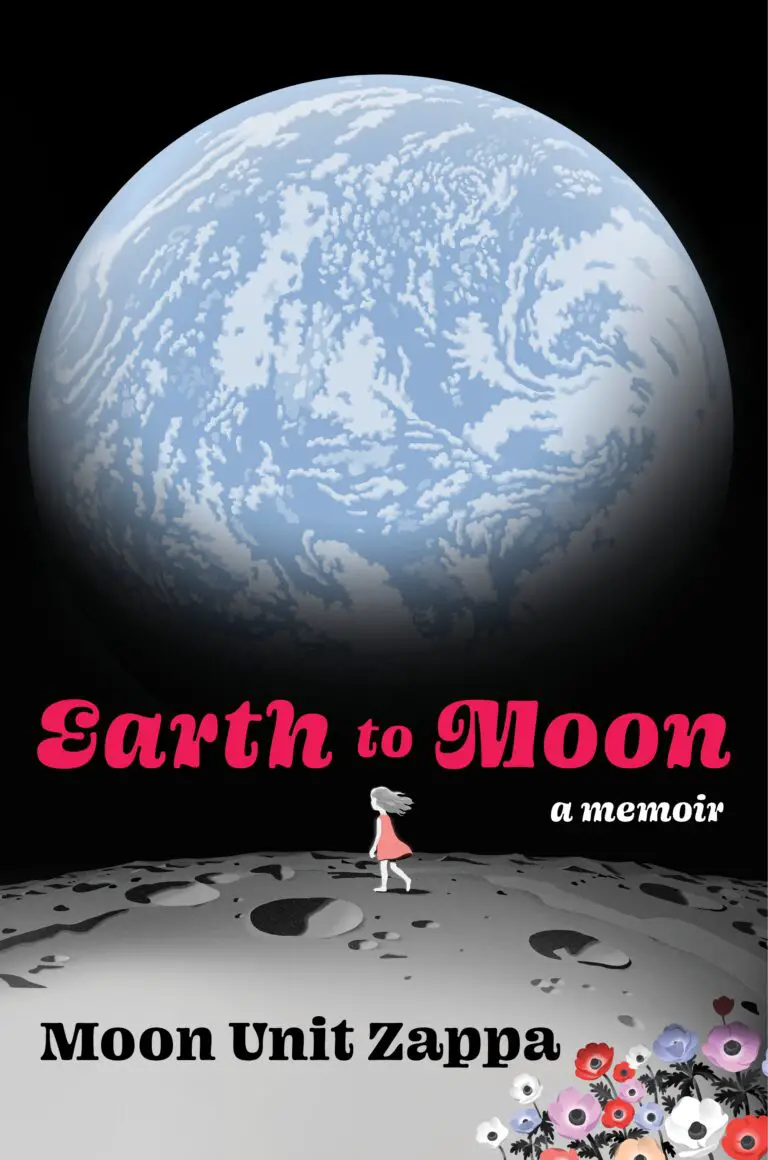In 1978, Christina Crawford published Mommie Dearest, a stunning memoir/exposé about the hardship endured growing up with her cruel and unbalanced mother – screen legend Joan Crawford.
While there is no brandishing of coat hangers a la Crawford in Earth to Moon (Deyst/William Morrow), Moon Zappa’s new memoir presents the disturbing realities of growing up as the eldest child of rock legend Frank Zappa and his neglected, bossy, and controlling wife, Gail.

First off, let’s talk about Frank Zappa. Undoubtedly, he is one of my favorite all-time musicians – as a composer, guitarist, and socio-political commentator. I adored his early works with the original Mothers of Invention, albums like We’re On In It for the Money and Burnt Weeny Sandwich, and also his early- to mid-‘70s output like Hot Rats, Overnight Sensation and Roxy & Elsewhere. And while he lost me for a while in the ‘80s, he was back at the top of my list with his final works, The Yellow Shark and Civilization Part III.
Like Picasso and other uber-productive artists, Frank was completely and utterly self-absorbed. As beloved and admired as he was by his children, he saw very little of them – spending nine months a year on the road. And when he was home, he rose every day at 5 pm and headed to his recording studio in the basement. Also, like Picasso, he was the ultimate horndog. Zappa carried on countless affairs while on the road and even under his own roof (one groupie reportedly lived under the piano in his home studio). The latter made his wife, Gail, a very unhappy woman who often took her frustrations out on her children. And it was her firstborn, Moon, who was the main sounding board for her woes and the chief recipient of her ire.
Like her father, Moon is a supremely talented individual—a writer of several books, an actress, an entrepreneur, a spiritualist, and a bit of a comedian too. The genesis of this book goes back to her fifth Christmas, when she received the first of her hardback-bound journals from her parents. This is something that would become an annual tradition and launch her lifetime practice of chronicling life events and her feelings.

“I partly wrote this memoir as a reclamation, to tell my version of what happened in my childhood and early life as a gift to myself, as a map that charts how and when I ended up as an adult,” she writes in the introduction to her book. “Growing up doesn’t end when you become an adult…Make peace with what hurts and head toward joy… Write your future with the ink of today.”
Moon’s sketches of childhood begin with her memorable name, Moon Unit. I had never heard that the “unit” stood for Frank’s belief that her birth made the family a true entity. When she is still way too young to hear it, her mother shares that “pushing you out of my vagina gave me the best orgasm of my life.” The Zappa household is bedlam. There are various band members, the Zappa-sponsored groupie/girl group, The GTOs, visiting rock royalty like Mick Jagger and Eric Clapton, scenester oddballs, and truly mentally unbalanced freaks like Wildman Fischer crashing through at all hours. She hates that her parents didn’t wear underwear. Above all, Moon craves “stability and structure.” She is frightened of the basement room where his dad keeps the suitcases he uses for touring. She believes there are aliens living down there (UFOs were one of Gail’s woo-woo obsessions). Moon would seek protection from the imaginary aliens from an unlikely source – two invisible camels. At four, she tries to run away to Hollywood and the famous Schwab’s Drugstore where Lana Turner was discovered, intent on becoming an actress.
When Moon gets mad that her birthday is being celebrated after her younger brother’s one September, her mother puts her in a cold shower. Gail tape records her screams and plays them back to a horrified Moon. She decides then and there that she doesn’t want to be anything like her mother. When Frank is away on tour, she will head to the soundproof vocal booth in his home studio to “scream away” her stress.
While Frank’s absence looms large in her life and this book, some cherished moments are chronicled. In one, they visit the zoo to see a cheetah Frank and Gail have adopted. Frank gets her a commemorative coin with “Moon Unit Is Beautiful” imprinted on it. When she is nine, they share a private moment where Frank shows her his favorite records: Erik Satie, the Goldberg Variation and Johnny Guitar Watson. He then gifts her his huge collection of 45s.
Gail shares with Moon her obsessions, one of which is the witchcraft her mother employs against Frank’s many groupies. At 11, Moon casts a spell of her own on a school bully. Moon hangs up her pointy hat and broom when her classmate is injured falling off the monkey bars.

In an attempt to bond with her dad, Moon slips a letter under his studio door to reintroduce herself to him. This will lead to their collaborative effort, the hit song “Valley Girl.” Moon’s impression of a So-Cal Valley speak is modeled on a girl she meets at a bar mitzvah. It will be Frank’s biggest commercial success and Moon will be thrust into the promotional spotlight though horrified by her teenage acne. Ever the needler, Gail will tell her that Frank wouldn’t give her writing credit or money until she insisted he do so. “Earth to Moon” is the phrase Gail will deploy to disparagingly gain her attention.
The success of “Valley Girl” will lead Moon to an acting career, her first on-screen kiss with Erik Estrada on the TV series CHiPs, and her first date with actor Emilio Estevez. To have time for her career, she will be put into a school with other young entertainers, including Janet Jackson and Jason and Justine Bateman, the latter who becomes a lifelong friend. This will be followed by roles in films like Fast Times at Ridgemont High and stints as a VJ on MTV, with her brother Dweezil, and later VH-1. Moon and Dweezil will also star in their own short-lived TV series, Normal Life.
One of the most moving parts of the book deals with Frank’s battle with terminal prostate cancer. Gail thinks it’s ironic that he got the kind of cancer that would impact his ability to have sex with women… other women. Another revelation is that Frank will ask Gail for a divorce several times during their marriage, and during his final illness, to be with a German woman named Gerde. Moon will overhear (and be horrified by) her mother speaking with a New Zealand groupie who wants the dying Frank’s “seed” to have a child. We hear about his compulsion to continue to work and the Friday “Margarita Nights” where Frank is entertained by the likes of The Chieftains, Ravi Shankar, Tibetan monks, Tuvan Throat singers and The Simpsons creator Matt Groening. We also hear how Gail makes Moon sell her home to pay for Frank’s treatment… as the genius musician had no health insurance.
With Frank’s death, the family unravels, largely due to Gail’s machinations. She lies, saying he died without a will and in debt. She will sell his music catalog twice and go on a real estate spending spree before also ending up financially strapped. With Gail’s death from lung cancer, after Moon helps nurse her in her final days, she will set up the uneven distribution of power and assets between her children, which will lead to their current legal battles and estrangement. It’s “the final perfect chess move,” one that sews the family chaos that persists to this day.
But Moon will also come to admire her mother’s strength, and to have a bit of sympathy for her suffering at the hands of Frank’s artistic self-absorption and roving eye. “She never deserted her post as our leader in battle. Even if she helped perpetuate the war.”
With the parents passing, Moon’s life is still a battle and an object lesson in achieving self-realization and peace. In the book, she describes her marriage and divorce and a truly horrifying chapter on the life-threatening illness of her then three-year-old daughter, Matilda. She will move to Taos, study and teach meditation and yoga online, start a successful tea company, and continue her very fine writing. She comes to the realization that her mother’s actions are what set her free to be herself.
Near the close of the book, she writes of her parents: “Together, the two of you taught me the hard lesson that you can die before you die and live beyond your death. As a duo, you created the map and destroyed the key.”
Moon Zappa will in Woodstock at the Golden Notebook Bookstore on October 13 at 1 pm. For details, visit goldennotebook.com/events.


Comments are closed.